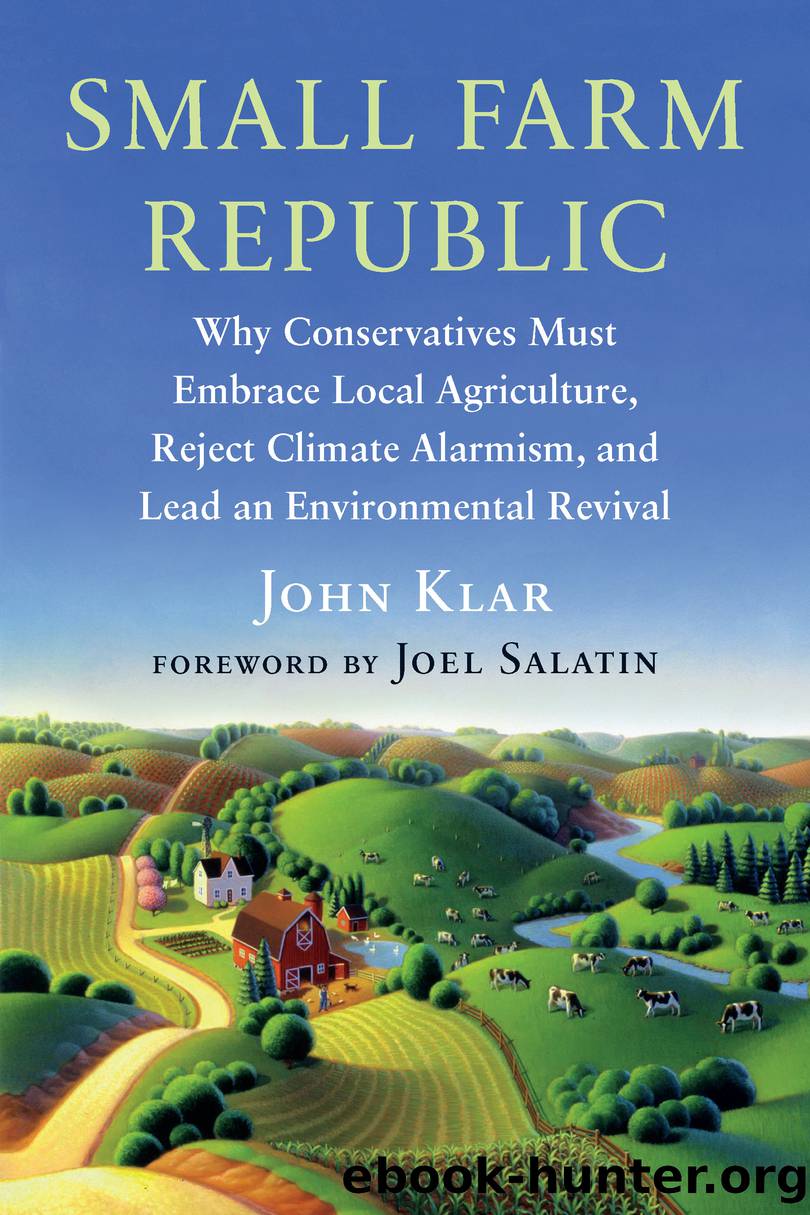Small Farm Republic by John Klar

Author:John Klar
Language: eng
Format: epub
Publisher: Chelsea Green Publishing
âProbably.â That is a moral and policy judgment impacting millions of people, and it merits better evaluationâespecially by voters expected to pay the tab.
But not all energy has the same usages. How can a society equate energy used to produce food with energy used to watch a movie? There has been a rush to stop farmers from polluting, even if it puts them out of business and drives up food costs or results in shortages. The same disconnected urban idiocy that enacts zoning laws that ban chickens is hellbent on taxing food production while giving a pass to recreational pollution like snow-making machines at ski resorts, water and amusement parks, and the international tourism industry. So much is being done to curtail dairy farms, yet there is zero attention to the 600 million gallons of gas burned annually in American lawnmowers lacking pollution-control technologies, routinely mowing an area that now exceeds the state of Texas. Farms are ever more regulated, while parking lots and asphalt are constructed with little pause.
The Green New Deal and the environmental movement are, in their current form, just a modern fad with no policy meat. The hype and emotionally charged celebrity displays are built on absurd mistruths and oversimplifications. Cows are suddenly targeted as eco-culprits, the world is ending any day, all other issues pale in comparison, and the poor people in the Amazon must be saved by American virtue-signaling consumers with no clue.6
This is not only counterproductive, it is a dangerous thrust toward domination.7 That the Green New Deal is a scam is plain from the failures of its proposed policies to do much more than dream. The truth is that these technologies cannot begin to replace existing fossil fuel energy sources and so are just a delay.8 The failures of the Green New Deal and these âsustainableâ product frauds must be juxtaposed against the positive benefits of transforming Americaâs industrial-agricultural dependency. A local and more regenerative agricultural infrastructure will actually reduce the threats of food inflation and food insecurity, preventively rather than reactively.
The ethanol debacle is a perfect example of the co-opting of environmental policy by corporate and government crooks who try to divert such movements to their own profit. Let us not forget the Obama administrationâs quick move to do the same with GMO-labeling requirements, quickly pivoting to make national labeling as fuzzy and useless as possibleâa result that did worse than nothing to inform consumers. Instead, the ability of corporations to deceive the public was enhanced.
Ethanol, too, has done worse than nothing to improve the environment. It subsidized an expansion of soil-eroding and water-polluting fossil-fuel-dependent corn production to provide profits to manufacturers who could compel the guaranteed purchase of their new commodity while it destroyed small engines and cars and reduced their useful lives, increasing overall pollution (and, yet again, corporate profits). Additionally, this policy shift drove up corn prices and contributed to global hunger and poverty.9
As with renewable energy manufacturing, ethanol didnât simply displace gasoline without a cost. Massive amounts
Download
This site does not store any files on its server. We only index and link to content provided by other sites. Please contact the content providers to delete copyright contents if any and email us, we'll remove relevant links or contents immediately.
Nudge - Improving Decisions about Health, Wealth, and Happiness by Thaler Sunstein(6644)
iGen by Jean M. Twenge(4708)
The Fire Next Time by James Baldwin(4352)
Adulting by Kelly Williams Brown(3682)
The Sports Rules Book by Human Kinetics(3597)
The Hacking of the American Mind by Robert H. Lustig(3589)
The Ethical Slut by Janet W. Hardy(3513)
Captivate by Vanessa Van Edwards(3310)
Mummy Knew by Lisa James(3176)
In a Sunburned Country by Bill Bryson(2954)
The Worm at the Core by Sheldon Solomon(2929)
Ants Among Elephants by Sujatha Gidla(2929)
Suicide: A Study in Sociology by Emile Durkheim(2617)
The Slow Fix: Solve Problems, Work Smarter, and Live Better In a World Addicted to Speed by Carl Honore(2579)
Humans of New York by Brandon Stanton(2383)
Handbook of Forensic Sociology and Psychology by Stephen J. Morewitz & Mark L. Goldstein(2380)
Blackwell Companion to Sociology, The by Judith R. Blau(2320)
The Happy Hooker by Xaviera Hollander(2277)
Outliers by Malcolm Gladwell(2263)
